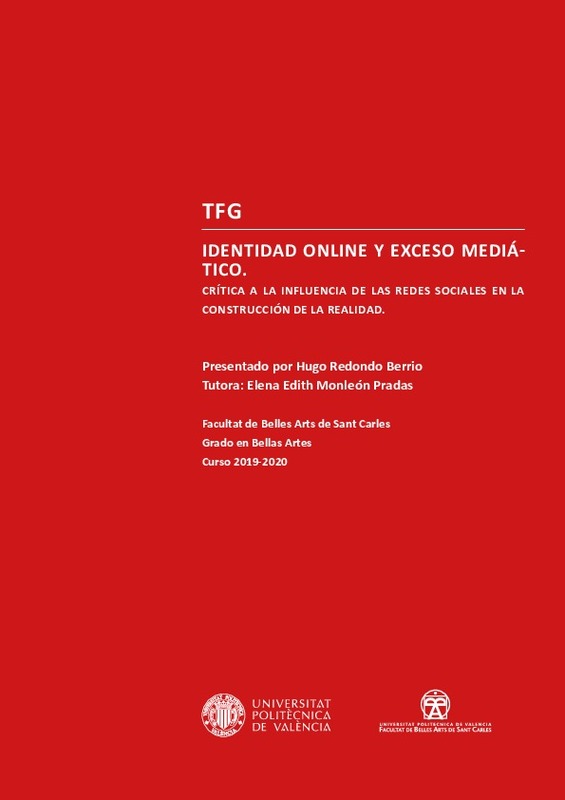|
Resumen:
|
[ES] Este trabajo de final de grado consistirá en lanzar una crítica a la construcción social del individuo influenciada por los medios visuales, así como por toda la información que podemos recibir a través de ella: ...[+]
[ES] Este trabajo de final de grado consistirá en lanzar una crítica a la construcción social del individuo influenciada por los medios visuales, así como por toda la información que podemos recibir a través de ella: ideología; estereotipos; creencias; mentiras; o verdades. Nos preocupa fundamentalmente cómo toda esta información es absorbida por el usuario medio contemporáneo. Durante toda la evolución, el ser humano siempre ha tenido un prototipo de referencia estándar el cual se ha formado a raíz de las influencias que le rodeaban y el caché o significado que aportaba cada una: una construcción que reúne las características de cada persona y que se van adaptando hacia lo que la sociedad del momento considera bien o mal: su color de piel; su estatus social; o su ideología, conservadora o progresista; la ropa con la que va vestido; sus maneras; género, etc.
Hoy en día, estos parámetros permanecen, pero se camuflan con toda la diversidad que alberga la digitalización global. Aun creyéndonos libres por esta diversidad, nos rodean todo tipo de estímulos que influyen en nuestra forma de ser: anuncios en Instagram; promociones por influencers; tribus urbanas; personajes de televisión; series; etcétera. Una larga lista en la que todo es perfecto y todos queremos anhelar ser como quienes vemos, adentrándonos en este circuito del espectáculo para ver quién da más, convirtiéndonos en una jungla de competitividad en la mayoría de los casos, llegando a basar nuestra vida y salud mental en este circuito en el que si no somos aceptados, no valemos; olvidándonos de si queremos algo por interés espiritual o material, causando muchas veces inseguridades y ansiedades que no se hablan en la cotidianeidad pero que todo el mundo padece por no ser suficiente en la época del eterno ¿show off¿ en la que vivimos; aparentando no ser o decir con tal de no sentirnos expuestos o indefensos. La reivindicación de este proyecto se basa en una deconstrucción de la formación de la identidad del ¿Yo¿ virtual fomentado por la sociedad cibernética actual e intenta enfocarlo hacia una realidad benévola para nosotras mismas como personas y, por lo tanto, para al resto de la comunidad virtual. Intentamos mostrar que no todo es tan mecánico como parece y que la idiosincrasia del individuo tiene más efecto de lo que pensamos.
[-]
[EN] This diploma will consist of a critique on how today¿s social behaviors are ruled by social and visual media how that information is received and absorbed by today¿s contemporary society. This information includes ...[+]
[EN] This diploma will consist of a critique on how today¿s social behaviors are ruled by social and visual media how that information is received and absorbed by today¿s contemporary society. This information includes ideology, stereotypes, beliefs, truths, and lies. Throughout history, human beings have always had a reference point where they could themselves feeling attached or inspired in some way, shape, or form. This standardized reference has normally built in order to categorize people in good or bad ways. Some of these matters included ethnicity, dress codes, progressive vs conservative thinking patterns, genders, or manners.
These parameters are still ruling individuals mind but camouflaged by the vast diversity in digital globalization: Advertisements, influencers from around the world, attractiveness, tv characters, urban tribes, singers, or anything else that people can dream of that takes part in today¿s digital times. This made-up dream can influence us to forget what we value and go to whatever lengths it takes to reach that often-unrealistic quality of life. It¿s kind of a sympathy that seduces us in order to forget everything and do whatever it takes to reach that quality of life, and in order to get it we have to work, be productive, and have the best image possible from ourselves, no matter if we want something because someone else have it or because it¿s necessary (necessary?) to us: not distinguishing between spiritual and materialistic matters. But what happens next is what occurs every time something seems so simple: Anxiety or fears haunts the ones not posting considering those who are portraying an ideal lifestyle and insecurities arise because we don¿t feel like we have enough or are not enough and we don¿t talk about it, we hide it.
All becomes superficially and smooth, no kind of regrets or negativity can be seen in this absolute perfection that social media and globalization are portraying. There¿s no room for the one who doesn¿t fit in this standards and no one will speak about it, because being honest or admitting that we might not be who we are showing could demand terrible in this standards where the fake sympathy seems to be the only choice. The revindication is born from an identity deconstruction from the virtual ¿I¿, influenced by digital societies. To show that everything is not as mechanic as it seems and how every individual¿s idiosyncrasy is worth analyzing to see how much of a difference can the user make from its own.
[-]
|







